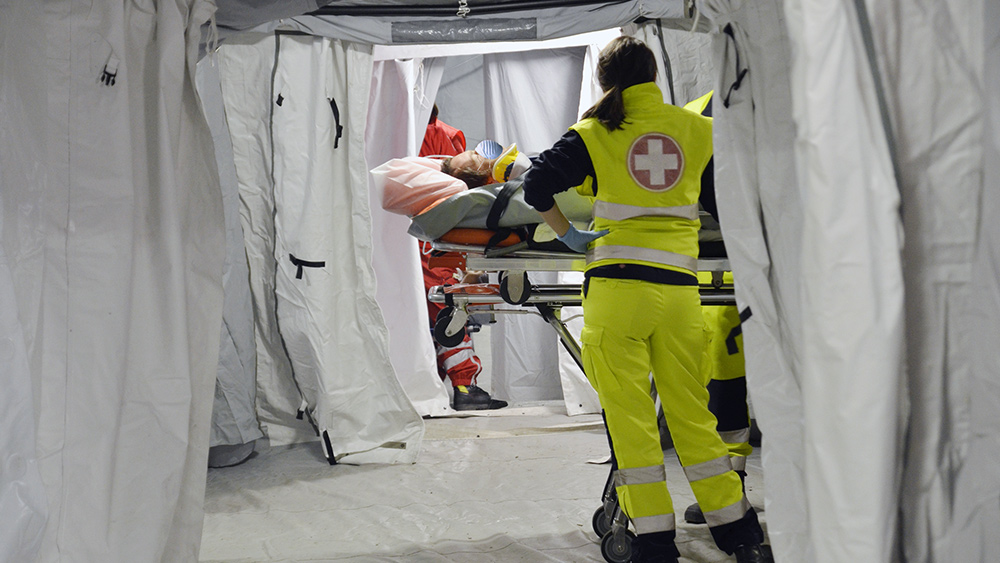Being fat doubles your risk of dying from coronavirus, study claims
08/09/2020 / By Ethan Huff

A new study published in the journal Public Health England has found that being overweight dramatically increases one’s risk of dying from the Wuhan coronavirus (COVID-19).
Entitled, “Excess Weight and COVID-19: Insights from new evidence,” the paper looks at various infection outcomes in relation to body mass index (BMI), including risk of hospitalization, intensive care treatment, and death. It also looks at the link between weight gain and alcohol consumption, which has skyrocketed ever since the lockdowns were implemented.
After accounting for various demographic and socioeconomic factors, including income level, the research team discovered that the fatter a person is, the greater his or her chance of becoming seriously ill and/or dying from the Wuhan coronavirus (COVID-19).
The hazard ratios of ICU (intensive care unit) admission for Wuhan coronavirus (COVID-19) patients are overweight (BMI ? 25-29.9), obese (BMI ? 30-34.9), or severely obese (BMI ? 35) were found to be 1.64, 2.59, and 4.35, respectively, relative to patients with a BMI of ? 20-24.9.
Looking at these hazard ratios in correlation to one another clearly shows that an expanding waistline equates to an expanding risk of severe Wuhan coronavirus (COVID-19) complications, especially compared to those considered to be of a healthy weight.
Since black women are among the most obese demographic, according to a data chart included in the study, this would seem to explain the “disproportionately” high rates of Wuhan coronavirus (COVID-19) infections that are said to impact the African American community.
These findings reiterate those published in a related study out of France, which found that obese people are up to seven times more likely to develop serious respiratory diseases that require hospitalization, potentially leading to death.
Forcing people to work at home is only making the problem worse
The Wuhan coronavirus (COVID-19) stay-at-home orders have only exacerbated the problem by making people even more sedentary, depressed and confined to small spaces where they are even less likely to get up and move.
Research published in the journal Clinical Obesity found that efforts to contain the Wuhan coronavirus (COVID-19) through self-isolation only ended up creating new problems in the form of more unhealthy people with greater susceptibility to infection.
“Public health strategies to control the outbreak that focused on social distancing have led to an increase in loneliness and social isolation, which play a significant role in behaviors that influence body weight,” the authors wrote.
Shockingly, nearly three-quarters of all people surveyed who were affected by the lockdowns and stay-at-home orders say that they had a much harder time achieving their weight loss goals. Even more than that, nearly 90 percent, indicated that they did not even leave their homes except to go grocery shopping.
All of this sitting around at home and doing nothing has created an even fatter population than existed before, which the evidence indicates is a major risk factor for the Wuhan coronavirus (COVID-19).
“You don’t have to contract the virus to be adversely affected by it,” is how Dr. Jamie Almandoz, M.D., an assistant professor of internal medicine at UT Southwestern Medical Center, put it.
“The major strength of this study is that it is one of the first data-driven snapshots into how the COVID-19 pandemic has influenced health behaviors for patients with obesity,” Dr. Almandoz added about the Clinical Obesity research.
The moral of the story is that efforts to contain the Wuhan coronavirus (COVID-19) appear to be making things worse in other areas, suggesting that perhaps it is time to just go back to the old normal and call it a day.
More related news about the Wuhan coronavirus (COVID-19) is available at Pandemic.news.
Sources for this article include:
Tagged Under: coronavirus, covid-19, death, death risk, dying, infections, obesity, outbreak, pandemic, research, risk
RECENT NEWS & ARTICLES
COPYRIGHT © 2017 FIGHTOBESITY.NEWS
All content posted on this site is protected under Free Speech. FightObesity.news is not responsible for content written by contributing authors. The information on this site is provided for educational and entertainment purposes only. It is not intended as a substitute for professional advice of any kind. FightObesity.news assumes no responsibility for the use or misuse of this material. All trademarks, registered trademarks and service marks mentioned on this site are the property of their respective owners.



















